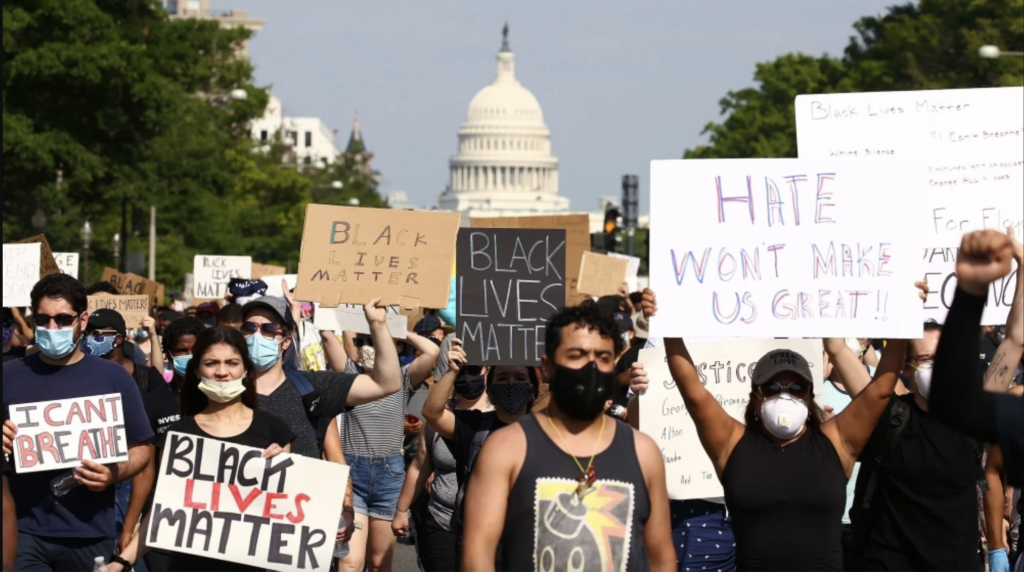Three protesters are suing the District of Columbia Metropolitan Police Department (D.C. MPD) alleging use of non-lethal weapons against racial justice protesters in the summer of 2020.
The three protesters, who reside in the District, Virginia and Connecticut, filed their lawsuit Feb. 22, claiming they were injured by weapons – including stinger grenades, rubber bullets and flash bang devices – during Black Lives Matter protests throughout the summer, causing injuries ranging from lacerations and bruising to emotional damage and mental anguish.
The lawsuit, Ferris et al v. District of Columbia, alleges that all three plaintiffs protested peacefully at racial justice demonstrations held in the District in the aftermath of the murder of George Floyd and had wounds consistent with stinger grenades, foam or rubber bullets and flash bang devices inflicted by D.C. MPD.
The lawsuit claims the D.C. MPD’s actions violated the First Amendment rights of speech, assembly and petition and the Fourth Amendment protections against unreasonable search and seizure.
Elizabeth Ferris, a plaintiff in the complaint and one of the injured protesters, said she felt the D.C. police’s actions were unjust.
“People sworn to uphold the Constitution, which enshrines the right to protest, should not be attacking and injuring us,” Ferris said in a Feb. 22 press release. “We were there to challenge the institutionalized police violence perpetrated against Black and Brown people in the U.S. In response, the D.C. police doubled down, trampling rights and inflicting injuries on those who would challenge their impunity.”
Katherine Crowder, another plaintiff in the complaint, said the police’s actions were not unique to the protests she attended.
“After I was injured, I witnessed police launching indiscriminate attacks for months, over and over, injuring people standing up against racist police violence in Washington, D.C., and across the country,” Crowder said in the same Feb. 22 press release. “My hope with this lawsuit is to stop the police from carrying out these violent, vicious, and biased attacks. These assaults have to stop in order to protect the next wave of people taking a stand, or a knee, for justice that the police don’t like.”
The Partnership for Civil Justice Fund (PCJF) — a nonprofit legal organization based in D.C. that assists in cases regarding free speech and government transparency — and its Center for Protest Law & Litigation filed the lawsuit on behalf of the three protestors.
Mara Verheyden-Hilliard, constitutional rights lawyer and executive director of the PCJF, said the lawsuit is a means of holding the police accountable for their actions.
“The D.C. MPD has operated with impunity, violently attacking peaceful protestors demanding police reform,” Mara Verheyden-Hilliard said in the PCJF press release. “The MPD will continue to injure the residents of and visitors to the nation’s capital as long as they think there are no consequences.”
Dr. Kelsey Ball Fomengia, a licensed clinical psychologist and consultant for Georgetown University who specializes in mental health in communities of color and mitigating the physical and mental health effects of trauma, said use of such weapons on protestors can have severe consequences.
“The psychological impact of experiencing race-based violence can be just as damaging and long-lasting as the physical effects,” Ball Fomengia wrote to The Hoya. “Individuals who have experienced systemic racism and abuse during protests often report increased stress, higher heart rates and blood pressure, muscle tension, migraines, sleeplessness, feelings of sadness, outrage, fear, numbness, fatigue, and hopelessness.”
This complaint is far from the first or only lawsuit alleging police violence against protesters, though. Most notably, thousands of protesters marching in Lafayette Square on June 1, 2020 were forcibly cleared using rubber bullets, grenades and tear gas to make way for President Trump’s appearance in front of St. John’s Episcopal Church.
As a result of immense public outrage in the wake of the protest, the D.C. Council unanimously passed an emergency police reform bill that prohibited the use of tear gas, pepper spray, riot gear, rubber bullets and stun grenades by MPD eight days later. However, D.C. Mayor Muriel Bowser (D) did not sign the bill until July 22, and it only remained in effect for 90 days after it was enacted.

The PCJF is alleging that within this 90-day period, D.C. police officers continued to indiscriminately use non-lethal weapons against protesters without giving them adequate time to disperse.
Ball said the protestors’ experiences have the potential to affect more than just themselves and their physical and mental health.
“It is important to note that ‘vicarious trauma’ (i.e. second-hand exposure to traumatic stories through news and social media) can result in many of the same physical and psychological damages as direct exposure,” Ball Fomengia wrote to The Hoya.
Ball said it is important for individuals to advocate for their community while also preserving their mental health.
“Speaking up and demanding change when social injustices occur is often a critical part of one’s healing journey,” Ball wrote to The Hoya. “At the same time, it is important to acknowledge that the fight for justice can be exhausting. Tending to your emotional health and ensuring you have the mental capacity to keep showing up in the pursuit of justice is equally essential.”




















